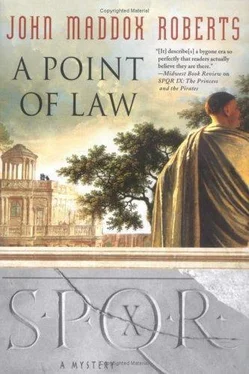John Roberts - A Point of Law
Здесь есть возможность читать онлайн «John Roberts - A Point of Law» весь текст электронной книги совершенно бесплатно (целиком полную версию без сокращений). В некоторых случаях можно слушать аудио, скачать через торрент в формате fb2 и присутствует краткое содержание. Год выпуска: 0101, ISBN: 0101, Издательство: St. Martin, Жанр: Исторический детектив, на английском языке. Описание произведения, (предисловие) а так же отзывы посетителей доступны на портале библиотеки ЛибКат.
- Название:A Point of Law
- Автор:
- Издательство:St. Martin
- Жанр:
- Год:0101
- ISBN:9780312337254
- Рейтинг книги:5 / 5. Голосов: 1
-
Избранное:Добавить в избранное
- Отзывы:
-
Ваша оценка:
- 100
- 1
- 2
- 3
- 4
- 5
A Point of Law: краткое содержание, описание и аннотация
Предлагаем к чтению аннотацию, описание, краткое содержание или предисловие (зависит от того, что написал сам автор книги «A Point of Law»). Если вы не нашли необходимую информацию о книге — напишите в комментариях, мы постараемся отыскать её.
A Point of Law — читать онлайн бесплатно полную книгу (весь текст) целиком
Ниже представлен текст книги, разбитый по страницам. Система сохранения места последней прочитанной страницы, позволяет с удобством читать онлайн бесплатно книгу «A Point of Law», без необходимости каждый раз заново искать на чём Вы остановились. Поставьте закладку, и сможете в любой момент перейти на страницу, на которой закончили чтение.
Интервал:
Закладка:
“A couple of years ago, when Caesar and Pompey were patching up one of their breaches, Caesar wanted Octavia to divorce Marcellus and marry Pompey. Caesar would set aside Calpurnia and marry Pompey’s daughter. But it didn’t work out somehow.”
“That must have made for some tense domestic suppers at Caesar’s house,” I said.
“Why?” Cato was honestly mystified at the suggestion that these women might resent being ordered to divorce and remarry at someone’s political whim. Pompey’s daughter was married to Faustus Sulla and had two children by him. In the event, Pompey had actually married the daughter of Metellus Scipio. She was the widow of Publius Crassus, who had died with his father at Carrhae. Our political marriages were as complicated as our electoral politics.
“Claudius Marcellus bids fair to be one of next year’s consuls,” I said. “What is he likely to do?”
“Now that Caesar’s soldiers are here, his colleague will be Lucius Aemilius Lepidus Paullus. You’ve seen the huge renovations going on at the Basilica Aemilia?”
“It’s hard to miss.”
“Well, Lucius will preside at its rededication, and his name will be carved on it as restorer, but it’s Caesar’s money that’s paid for the work.”
Erection or restoration of monuments was enormously important to any man’s prestige. Families traditionally saw to the upkeep of the monuments of their ancestors, as witness my new roof on the Porticus Metelli. By restoring the old basilica, Lucius Aemilius not only glorified himself, but he received credit for his piety in honoring his ancestors.
Something else occurred to me. Like many of Rome’s older structures, the Basilica Aemilia had more than one name. People sometimes called it the Basilica Fulvia.
It was barely noon when I went to the house of Callista. I had intended to call later, but since I might be arrested at anytime I thought it prudent to stop by early. Hermes was with me as usual, and the long walk to the Trans-Tiber took us through an almost deserted Rome because so much of the population had flocked to the Campus Martius to see the soldiers from Gaul. Like most of Caesar’s self-glorifying schemes, this one had proved to be a resounding success.
The majordomo greeted me at the door and guided me toward the peristyle garden. From that direction I could hear the sound of feminine voices in conversation. One of them said something, another laughed. Ordinarily I find such sounds pleasant, even soothing. But one of those voices sounded disturbingly familiar.
The two women were seated at a table next to a beautiful pool. One of them, naturally, was Callista. The other was Julia.
“Why, Senator!” Callista exclaimed, “I was not expecting you so early. How wonderful to have you and your lovely wife as my guests at the same time!”
“An unexpected pleasure indeed,” I said. “Julia, I am surprised you didn’t go out to see all those brawny, sweaty legionaries.”
“Oh, soldiers are such a common sight, even my uncle’s. But I couldn’t pass up a chance to meet the most learned lady in Rome. We have been having the most marvelous discussion on the work of Archimedes.”
“I don’t doubt it for a moment.” During our stay in Alexandria, Julia had dragged me along to see every tiresome philosopher and scholar in that whole overeducated city. She had an enthusiasm for learning that entirely eluded me.
“Once I began to study your documents, Senator,” Callista said, “I found myself so enthralled that I quite forgot the time. Eventually, my servants tired of replenishing the lamps and forced me to go to bed. But I was up at dawn and right back to work.”
“I never expected such zeal and cannot adequately thank you,” I said. “So you now have them translated?”
“I am afraid not. But I have made an excellent beginning. And I’ve made the most interesting discovery!”
“How so?” I asked, trying to mask my disappointment. Such rapid success was far too much to hope for.
She took the pages from a small chest upon the table. “You recall that I was puzzled by the repetition of the letter delta?”
“Indeed, I do.”
“Well, I was in despair when I finally went to bed last night. But I must have been visited by a god while I slept because when I awoke this morning I knew what it meant. It is something quite unprecedented.” She had a look of almost daemonic enthusiasm.
“What might this have been?” I asked her.
“Nothing!”
I was stunned. “I fail to-”
“Let her explain, dear,” Julia said. “We’ve discussed a bit of this, and I want to hear more.”
I sat and a servant brought me a cup. “Please do,” I urged.
“I know that it sounds absurd, but that delta means nothing at all, and that is what is so exciting. You see, I noticed that the delta was always repeated after a string of other letters, three to eight or so, and that nowhere was a delta doubled. When I woke this morning I realized that whoever encoded these documents intended to simplify decoding by separating the words with the delta, rather the way that some people, when writing, leave a small space between individual words.”
“I see,” I said. “It seems simple enough.”
“It is deceptively simple. But the implications are astounding. It is the use of a symbol to mean nothing at all! I think this is quite unprecedented. There is a subset of philosophy involving the meaning of symbols. I intend to correspond with some philosophers I know to discuss the implications of this. I think it could have great applications in mathematics as well.”
“I daresay it could,” I said, trying to sound wise. I had no idea what the woman was babbling about. To this day I have no idea. A symbol for nothing?It was as ridiculous as the paradoxes of Zeno.
Julia spoke up. “Callista thinks this might have been the very concept Archimedes was working on when that horrible soldier killed him.”
“Well,” I said, “that sort of thing happens in a war. He shouldn’t have spoken rudely to the man. Callista, were you able to make any other headway on the letters?”
“I am almost certain that the language is common Latin. The length and arrangement of the words suggest this. I haven’t yet discovered the key to the letter substitution though. I had thought it would be simple, but now I am sure it is not. A mind subtle enough to invent this delta symbol probably devised something more complex.”
“Maybe,” I said, “but you might be giving him too much credit. He may have hit on the delta as a handy way to separate words without giving a consideration to the deeper implications.” Whatever on earth those might be, I thought.
“You could be right,” she said doubtfully. “Did you happen to see, where you found these documents, any books, poems, other writings?”
“Why?”
“I believe this code employs substitution of one letter for another-in this case each Greek letter stands for a letter of the Latin alphabet-but in order to decipher it, I must have the key.”
“Key?” I said. “What might that be?”
“It could be a written instruction, but more likely what has been used will be a well-known book, such as the Homeric poems, Pindar, something like that. If one has the book and knows the system of substitution, decipherment becomes an easy if tedious process.”
I was not following this, but I trusted the woman to know what she was talking about.
“Now that I think of it, there were a few scrolls in a holder next to the desk. And one lying on it.” I searched my mind for memories of that stimulating afternoon. “The one on the desk was partially unrolled and it looked like it was one he read a lot. You know how it is with a favorite book-the papyrus was like cloth, and the edges had turned fuzzy. But it wasn’t some famous work like the Iliad .”
Читать дальшеИнтервал:
Закладка:
Похожие книги на «A Point of Law»
Представляем Вашему вниманию похожие книги на «A Point of Law» списком для выбора. Мы отобрали схожую по названию и смыслу литературу в надежде предоставить читателям больше вариантов отыскать новые, интересные, ещё непрочитанные произведения.
Обсуждение, отзывы о книге «A Point of Law» и просто собственные мнения читателей. Оставьте ваши комментарии, напишите, что Вы думаете о произведении, его смысле или главных героях. Укажите что конкретно понравилось, а что нет, и почему Вы так считаете.









